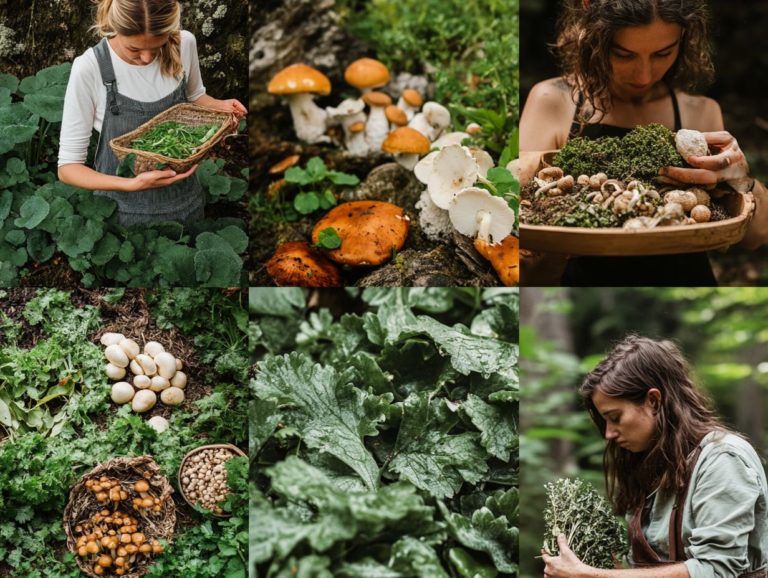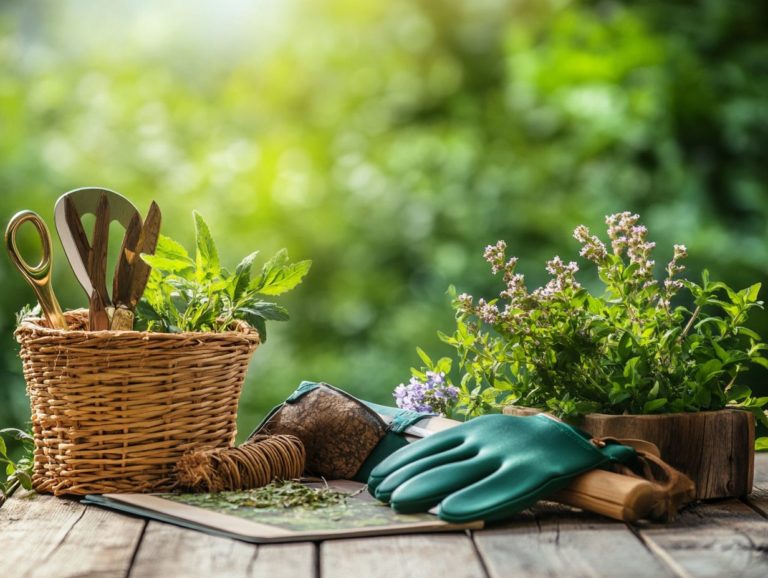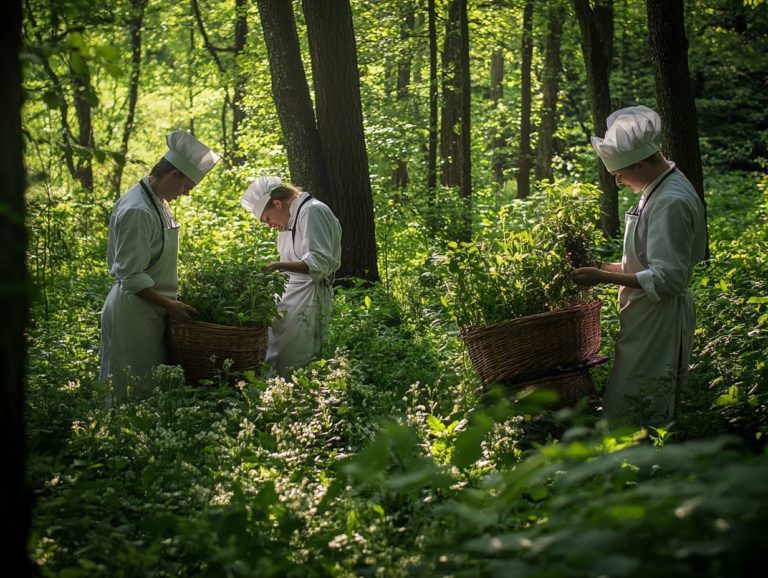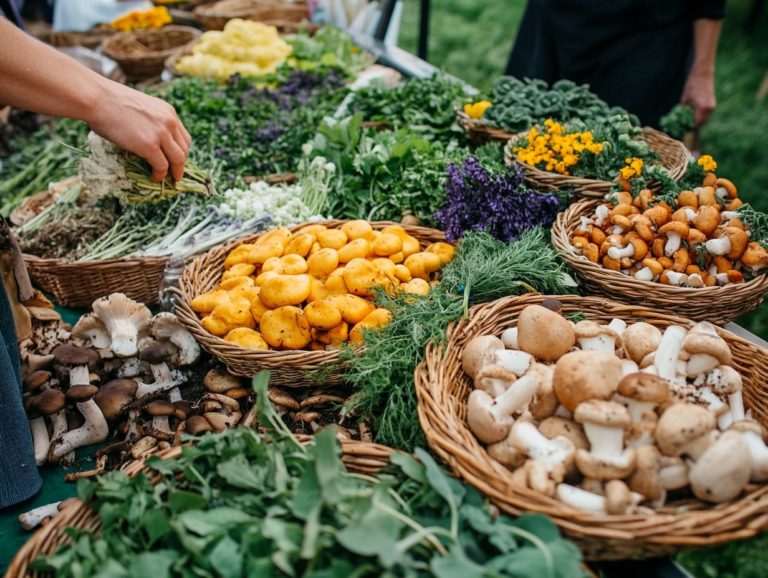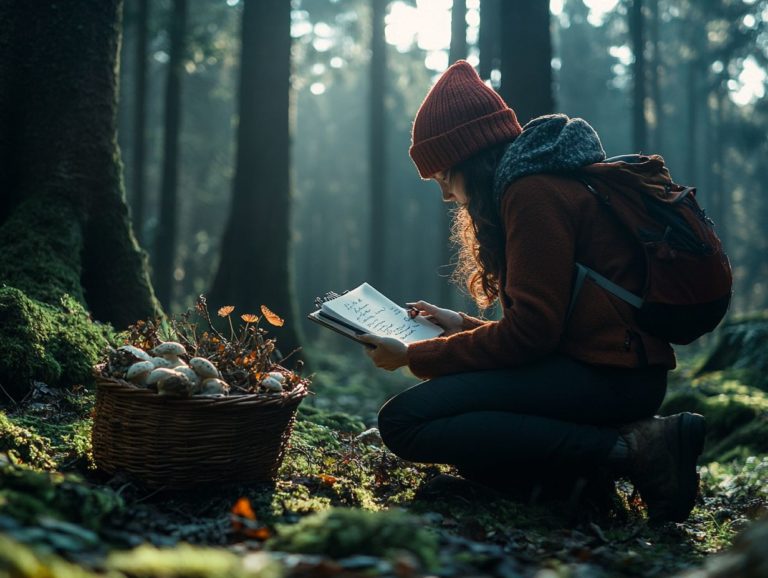5 Websites for Local Foraging Information
Foraging transcends mere trendiness; it serves as a profound opportunity to reconnect with nature and uncover the abundant bounty awaiting just beyond your doorstep.
This article delves into five invaluable websites that provide local foraging information, expertly guiding you on your quest for wild edibles.
You ll discover insights on the benefits of foraging, essential safety precautions, and delectable recipes that will enhance your experience.
Are you prepared to unveil the hidden treasures of your local landscape? Let s embark on this journey together.
Contents
- Key Takeaways:
- 1. EatTheWeeds.com
- 2. ForagingTexas.com
- 3. WildFoodForager.com
- 4. WildFoodGirl.com
- 5. ForageSF.com
- What Is Foraging and Why Is It Important?
- What Are the Benefits of Foraging Locally?
- How Can Foraging Help with Sustainable Living?
- What Are the Different Types of Foraging?
- What Are the Safety Precautions for Foraging?
- How Can One Get Started with Foraging?
- What Are the Common Misconceptions About Foraging?
- How Can Foraging Be Incorporated into Daily Life?
- What Are Some Recommended Foraging Tools and Resources?
- What Are Some Delicious Recipes Using Foraged Ingredients?
- How Can Foraging Help Connect with Nature and the Local Community?
- Frequently Asked Questions
- What are some good websites for finding information on local foraging?
- Are these websites suitable for beginners or more experienced foragers?
- Do these websites offer information specific to my local area?
- Are there any costs associated with using these websites?
- Can I contribute my own knowledge and experiences to these websites?
- Are these websites reliable sources of information?
Key Takeaways:
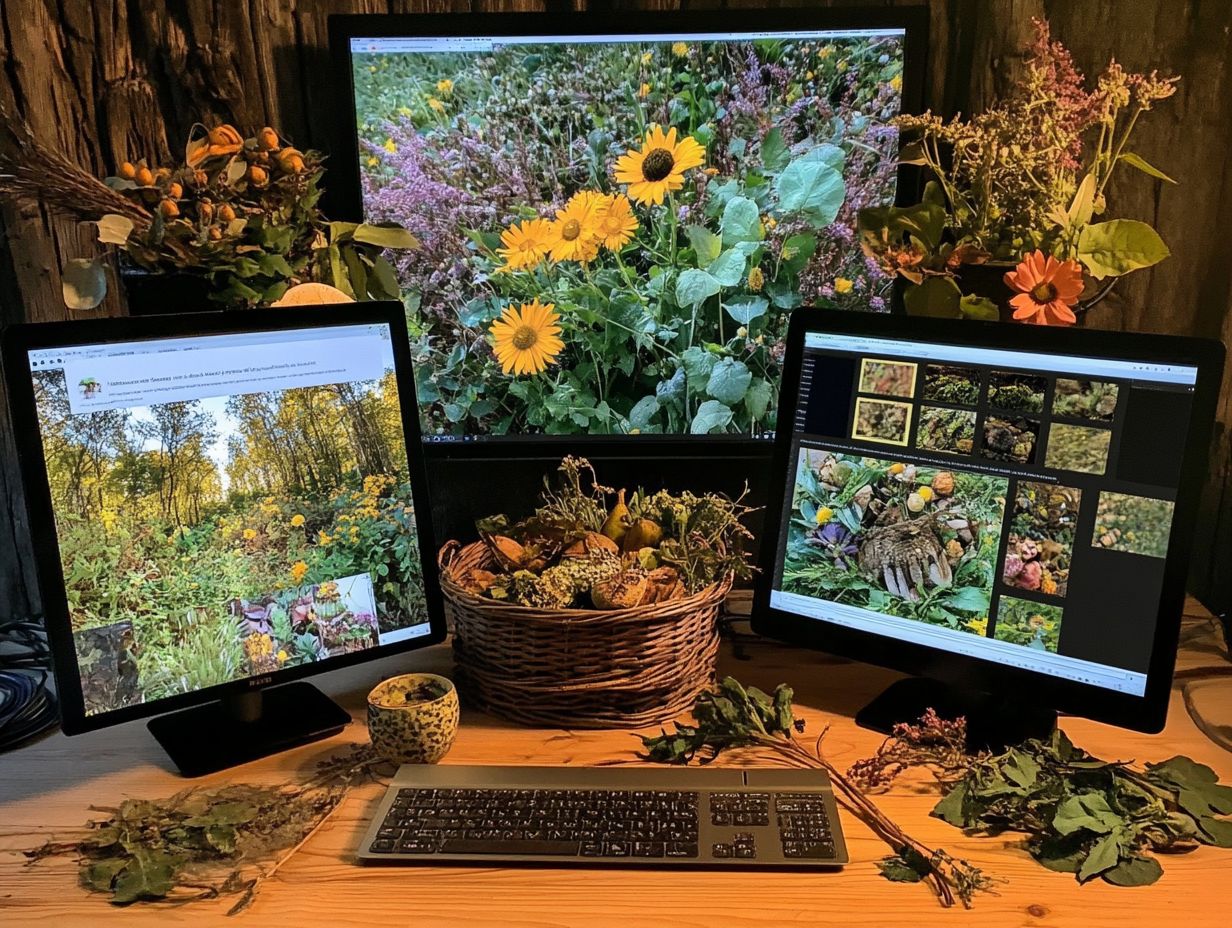
- Foraging is the practice of gathering wild food and can have various benefits, such as promoting sustainable living and connecting with nature and the local community.
- EatingTheWeeds.com, ForagingTexas.com, WildFoodForager.com, WildFoodGirl.com, and ForageSF.com are useful websites for finding local foraging information and resources.
- Before starting to forage, it is important to educate oneself on safety precautions and misconceptions and to have recommended tools and resources on hand. Delicious recipes can also be made using foraged ingredients.
1. EatTheWeeds.com
EatTheWeeds.com is your gateway to an extraordinary world of foraging. This guide is your key to uncovering everything you need to know about wild foods and edible plants. It offers essential information on identifying edible plants, wild mushrooms, and mastering various foraging techniques. It s not just a website; it s a premier hub for anyone eager to connect with nature through the delights of wild foods, complete with insights into responsible foraging practices.
Beyond just articles on plant identification, you’ll find a treasure trove of information on food preservation techniques that will help you maximize the lifespan of your foraged finds. The platform also connects you to specialized foraging courses, offering hands-on learning experiences that foster community engagement. For more detailed insights, explore resources that can help with foraging, deepening your connection to the local environment and introducing you to fellow enthusiasts who share your commitment to living in a way that protects nature and uses resources wisely.
By linking learners with seasoned foragers, this site creates a lively community that encourages the sharing of knowledge and experiences, enriching the wild food community as a whole.
2. ForagingTexas.com
ForagingTexas.com serves as an invaluable online resource designed specifically to educate you about the rich variety of wild greens and edible plants found throughout Texas. It emphasizes the critical importance of proper plant identification and sustainable harvesting techniques.
This platform not only offers seasonal foraging tips but also delves into the unique characteristics of local ecosystems, giving you the power to safely gather your bounty year-round. By grasping the regional nuances in foraging practices, you can make informed choices that honor both the land and its resources.
This resource builds a sense of community by connecting you with local groups and workshops, fostering collaboration and the sharing of knowledge. Such initiatives heighten awareness of environmental sustainability, encouraging responsible practices that protect ecosystems while nurturing your passion for wild foods.
3. WildFoodForager.com
WildFoodForager.com is your go-to online destination for culinary adventure through foraging. Here, you’ll discover a treasure trove of delicious recipes and insightful articles, along with the best local resources for foraging safety, that delve into the world of wild food across diverse ecosystems.
The site showcases an impressive array of wild edibles, highlighting the unique flavors of wild fruits like blackberries and raspberries, alongside the sought-after foraged mushrooms such as chanterelles and morels. You ll find inspiration in cooking recipes that celebrate these delectable ingredients and seamlessly incorporate them into your everyday meals for improved nutrition.
By shedding light on the health benefits of foraging, this platform reinforces the link between wild ingredients and a health-conscious lifestyle, all while championing sustainable practices that protect natural habitats and promote biodiversity.
4. WildFoodGirl.com
WildFoodGirl.com presents you with an exquisite collection of resources tailored for anyone captivated by foraging, wild food, and the medicinal wonders of various plants, all crafted by foraging expert Sunny Savage.
This website serves as your gateway to a treasure trove of knowledge, featuring in-depth guides on herbal remedies that tap into nature’s remarkable healing properties. Discover exciting ways to weave wild plants into your culinary creations, elevating ordinary meals into remarkable gastronomic experiences.
The platform also hosts engaging plant walks, inviting you to immerse yourself in nature while learning directly from seasoned foragers. By nurturing a vibrant sense of community and offering valuable educational resources, WildFoodGirl.com inspires you to embrace responsible foraging practices, giving you the power to appreciate and sustainably harvest the rich gifts that the wild has to offer.
5. ForageSF.com
ForageSF.com stands as a trailblazing platform that champions urban foraging and the establishment of food forests, guiding you to uncover the variety of wild foods nestled within your city s ecosystems.
Through thoughtfully curated initiatives, this platform presents engaging foraging events and immersive workshops that invite you to connect with nature, even amidst the urban hustle and bustle. You’ll find ample opportunities for community engagement, where you can share your experiences and insights, deepening your appreciation for the local biodiversity that surrounds you.
Urban gardening practices harmoniously intertwine with foraging, encouraging you to cultivate native plants that support wildlife and enhance your food sources. By sourcing food locally, you ll relish fresher ingredients while actively contributing to sustainability efforts. This also fosters stronger community ties and promotes a commitment to environmental stewardship, enriching both your life and the world around you.
What Is Foraging and Why Is It Important?
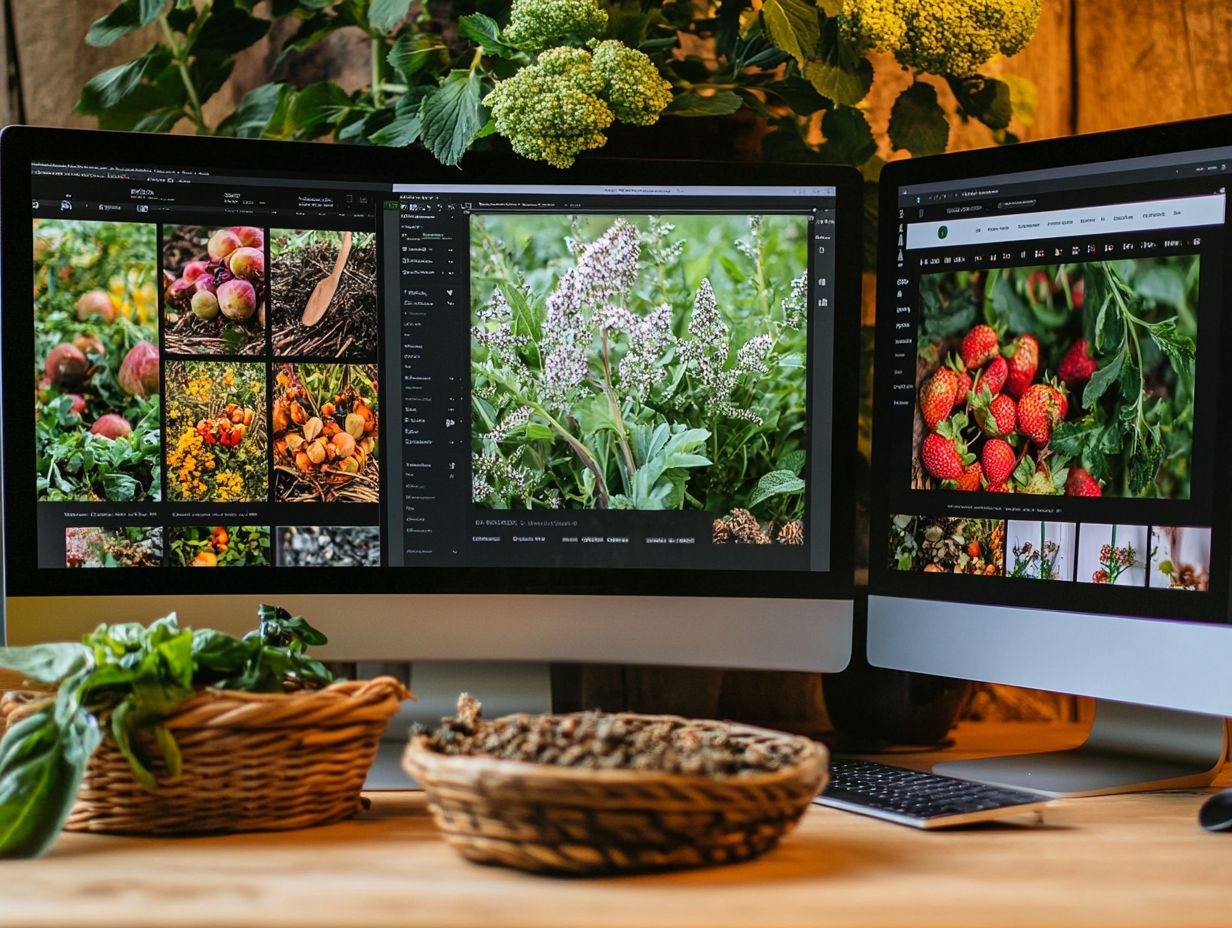
Foraging invites you to seek out edible wild plants and mushrooms in their natural habitats, fostering a profound connection with nature while championing environmental sustainability and food sourcing. As you learn to identify and harvest wild foods, you ll discover an abundance of free sustenance while gaining a deeper understanding of your local ecosystems and the critical importance of preserving biodiversity.
This age-old practice, deeply rooted in human history, serves as a bridge between modern living and ancestral traditions. For your ancestors, foraging was not just a pastime; it was essential for survival, revealing a deep reliance on the land for nourishment.
In today s world, foraging offers a plethora of ecological benefits, including supporting local wildlife and reducing dependence on mass-produced food systems. By embracing this practice, you can enrich your diet with nutrient-dense, seasonal ingredients while simultaneously lowering your carbon footprint.
This harmonious relationship with nature paves the way for healthier lifestyles and actively promotes sustainable living, encouraging you and your community to cherish and protect the natural resources that sustain us all.
What Are the Benefits of Foraging Locally?
Foraging locally brings a wealth of benefits, enhancing your nutrition with fresh wild foods while deepening your connection to the community and fostering a greater appreciation for local ecosystems and biodiversity.
Wild greens and fruits are often brimming with vitamins, minerals, and antioxidants, significantly boosting your overall health. By engaging in foraging activities, you not only gain valuable knowledge about your natural surroundings but also find opportunities to connect with others who share your passion.
Participating in guided plant walks led by experienced foragers creates a vibrant communal atmosphere. Here, you can swap recipes, share foraging tips, and recount personal experiences. This interaction not only strengthens community bonds but also unites members in discovering the value of local flora, fostering a deeper sense of belonging and stewardship toward the environment.
Start your foraging adventure today!
How Can Foraging Help with Sustainable Living?
Foraging plays a crucial role in sustainable living. It helps you reduce food waste and encourages responsible harvesting practices that support environmental sustainability and local ecosystems.
By connecting you directly with your food sources, foraging fosters a deeper appreciation for nature. It inspires you to make conscious choices about what you consume. This hands-on approach minimizes your reliance on commercial food systems while promoting biodiversity. It spotlights the importance of native plants and their roles within local habitats.
Understanding invasive species is essential. These non-native plants often disrupt local ecosystems and lead to reduced biodiversity. By educating yourself about these invasives, you can actively engage in ways to help the environment. This helps maintain the delicate balance of your local ecosystem while enjoying a more diverse and sustainable diet.
What Are the Different Types of Foraging?
There are many types of foraging for you to explore. These include mushroom hunting, wildcrafting, and harvesting wild edibles. Each of these activities offers unique experiences and benefits that can enrich your life.
These pursuits require a sharp eye and a deep well of knowledge. As a successful forager, you’ll need to identify a diverse array of plants and fungi. You must discern which ones are safe to consume and which ones are best left alone. For example, mushroom hunters must familiarize themselves with different habitats and seasonal growth patterns, as well as safe harvesting techniques. Meanwhile, wildcrafting emphasizes the sustainable collection of naturally occurring plants, demanding the ability to distinguish edible varieties from their toxic counterparts.
Engaging in these activities not only elevates your culinary adventures by incorporating foraged ingredients into your cooking but also nurtures a profound connection with nature. This experience fosters an appreciation for biodiversity and serves as a delightful reminder of the simple treasures that each season brings.
What Are the Safety Precautions for Foraging?
Safety is key to a successful foraging adventure! You’ll want to emphasize proper plant identification to steer clear of toxic species and ensure a safe and enjoyable foraging experience.
As you venture into the wild for foraging, consistently use the right tools designed for collecting and preparing food. This will streamline the process and reduce risks tied to improper handling. Explore various educational resources like field guides and online communities to assist in accurately identifying species.
By combining these strategies today, you ll cultivate a deeper understanding of your environment while minimizing the risks inherent in this rewarding outdoor activity.
How Can One Get Started with Foraging?
Ready to dive into foraging? It takes a mix of education, practice, and community support to get started!
You can enhance your journey by tapping into various educational resources, enrolling in foraging courses, and joining local plant walks to build your confidence and skills.
Consider seeking out local foraging groups. Connecting with experienced foragers and fellow newcomers not only provides valuable insights but also fosters a sense of community and shared learning. Utilize books dedicated to foraging, along with reputable online resources like foraging blogs, to deepen your understanding of edible plants and safe identification techniques. You can also explore the best educational resources for sustainable foraging to enhance your skills.
Attending hands-on workshops will also prove invaluable. These experiences allow you to practice your skills in a guided environment, solidifying your knowledge and boosting your confidence in your newfound abilities.
What Are the Common Misconceptions About Foraging?
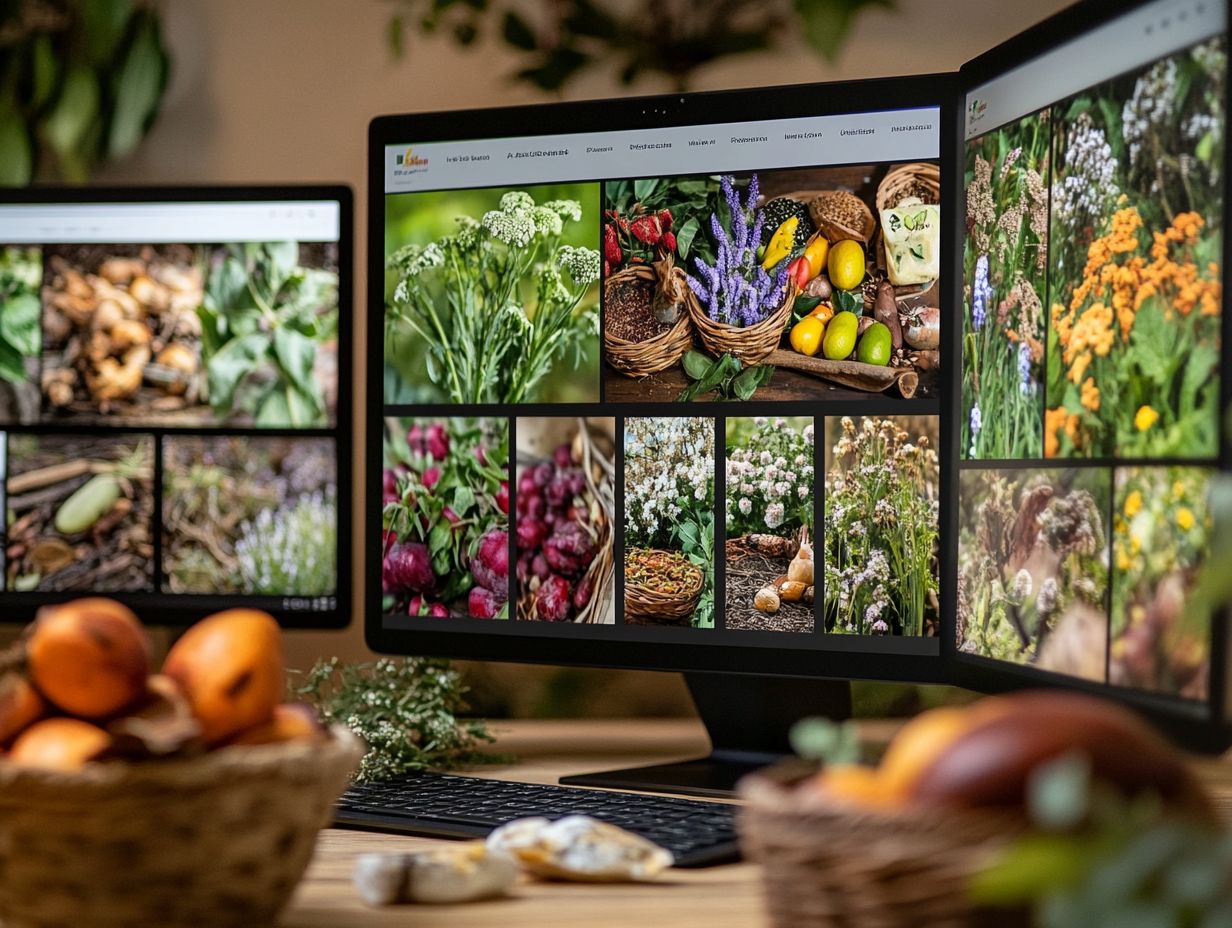
Think foraging is only for experts? Think again! It s an exciting adventure anyone can join. There are several common misconceptions about foraging that might be holding you back. You may believe it s only for survivalists or that all wild foods are safe to eat, which can deter you from diving into this enriching practice.
Foraging is so much more than just a survival skill; it s a lively community activity that welcomes people from all walks of life, regardless of age or experience, to connect with nature and explore its abundant offerings.
While it s crucial to know which plants and mushrooms are edible, a wealth of resources and local foraging groups are available to guide you in learning safely and responsibly.
The vibrant wild food communities out there demonstrate that foraging is not just a hobby, but a delightful pastime that fosters a deeper appreciation for local ecosystems and encourages sustainability in your food choices.
By demystifying foraging, you can embrace the thrill of gathering fresh, wild ingredients right from your backyard or nearby parks. Don t wait! Dive into the world of foraging today and experience the abundance of nature.
How Can Foraging Be Incorporated into Daily Life?
Incorporating foraging into your daily life can be seamlessly achieved by integrating wild plants into your meals, growing plants in your city, or practicing ways to keep your food fresh to make the most of those foraged treasures.
Explore seasonal recipes to whip up vibrant salads using tender dandelion greens or garnish your dishes with delicate wildflowers that not only elevate the flavor but also enhance the visual appeal.
Imagine crafting wild cocktails by infusing spirits with foraged herbs or using fresh berries for a refreshing twist that impresses at any gathering.
To ensure these unique ingredients don t go to waste, consider experimenting with drying, pickling, or making jams. This way, you can savor the flavors of nature throughout the year, enriching your culinary creativity and truly celebrating the bounty around you.
What Are Some Recommended Foraging Tools and Resources?
Having the right foraging tools is crucial for your foraging success. They ll help you identify plants accurately and practice responsible harvesting methods for wild food. Equipping yourself with a sturdy knife for precise cutting, a reliable basket for collecting your finds, and a comprehensive field guide can truly elevate your foraging experience.
Whether you’re just starting out or have been foraging for years, investing in reputable books and websites is essential to expand your knowledge. Resources like Josh Fecteau’s insightful guides and top regional foraging guides from Caleb Philips offer invaluable insights into local flora and necessary safety measures.
Engaging with communities and forums dedicated to foraging can provide you with support and continuous learning opportunities, ensuring that your pursuit of wild food remains both enjoyable and sustainable.
What Are Some Delicious Recipes Using Foraged Ingredients?
Delicious recipes featuring foraged ingredients can truly elevate your everyday meals, allowing you to showcase the vibrant flavors of wild food and embark on a delightful culinary adventure.
Picture yourself crafting savory mushroom risottos, richly infused with freshly gathered chanterelles, or refreshing salads adorned with vibrant dandelion greens and delicate wildflowers. These dishes not only celebrate your culinary creativity but also foster a deeper connection to the natural world around you.
As you gather seasonal ingredients, you can experiment with imaginative pairings that highlight the essence of each wild element. You re encouraged to dive into culinary communities centered around wild food, sharing your own adventures, tips, and variations to inspire fellow enthusiasts.
The beauty of foraging lies in its adaptability, giving you the power to tailor your creations based on the treasures nature provides each season. Get inspired and start your foraging journey today!
How Can Foraging Help Connect with Nature and the Local Community?
Foraging allows you to forge a deeper connection with nature while fostering community engagement! It brings people together to share their knowledge, experiences, and appreciation for wild foods and local ecosystems.
Communal experiences include plant walks and organized foraging events, where you not only learn to identify edible plants but also gain a richer understanding of how different plants and animals interact with each other in your local environment. Such gatherings serve as catalysts for building lasting friendships, creating a network of individuals who share a passion for sustainability and a commitment to promoting environmental stewardship.
Through conversations and shared stories during these activities, you cultivate a sense of belonging and dedication to preserving natural resources. This transforms what could be a solitary pursuit into a collaborative effort that enhances both your personal well-being and the greater community.
Frequently Asked Questions
What are some good websites for finding information on local foraging?
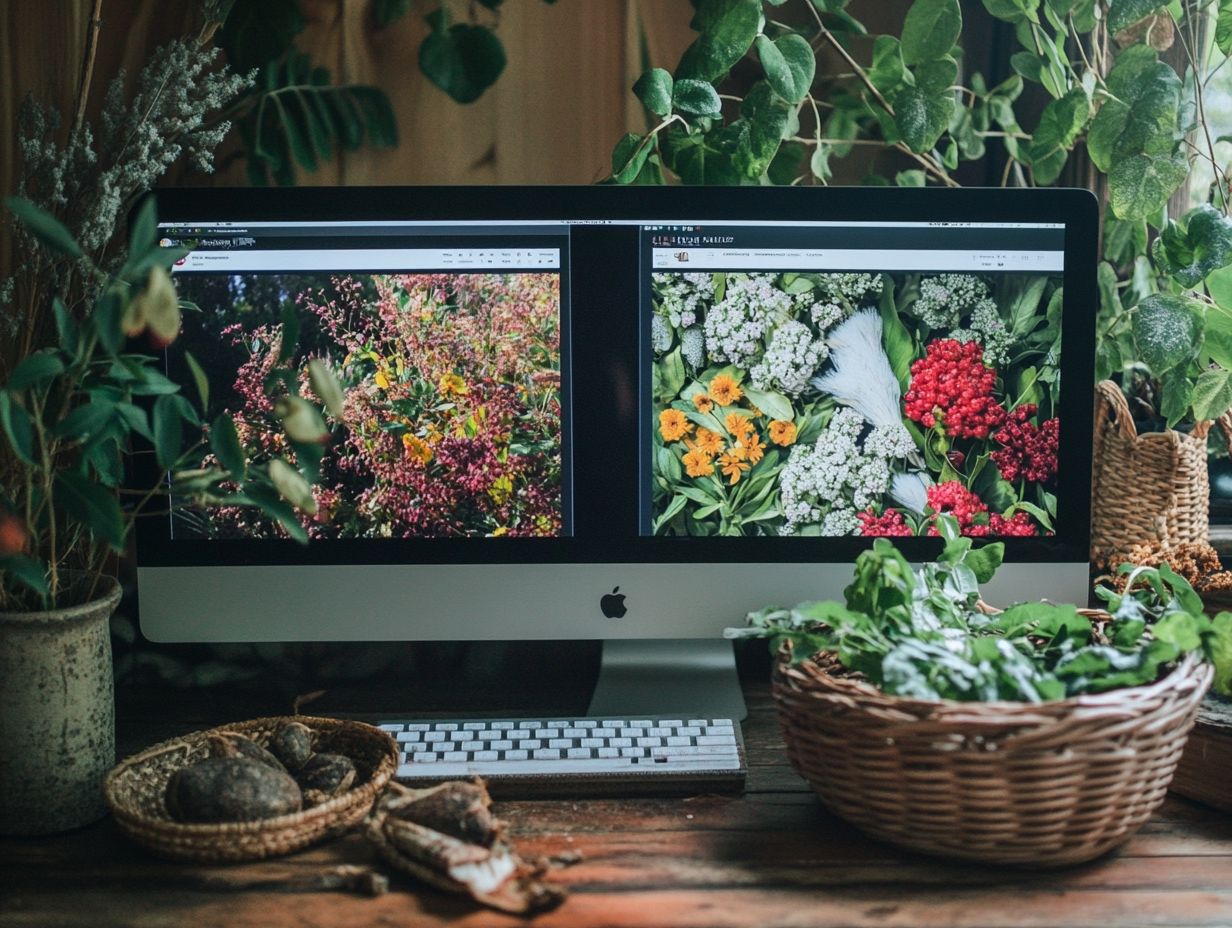
- Wild Food UK – This website offers a directory of foraging courses, events, and guided walks across the UK.
- Eat the Seasons – Provides information on what wild foods are in season in your local area, as well as recipes and tips for foraging.
- Forage Local – A community-driven website where users can share their foraging experiences and knowledge with others.
- The Foraging Course Company – Offers online and in-person foraging courses led by experienced foragers.
- Hedgerow Harvest – A comprehensive resource for foraging, with information on edible plants, recipes, and workshops.
Are these websites suitable for beginners or more experienced foragers?
All of the websites listed offer resources for both beginners and experienced foragers. They provide information on identifying and safely gathering wild foods, as well as top online resources for wild edible foraging, including recipes and tips for incorporating foraged foods into your diet.
Do these websites offer information specific to my local area?
Yes, most of these websites have resources specific to different regions within the UK. They may offer the best local resources for foraging edibles in your local area, as well as information on which wild foods are in season near you.
Are there any costs associated with using these websites?
Some of these websites may charge a fee for specific services, such as attending a foraging course. However, most of the information and resources provided, including insights on the best local foraging guides, are free to access.
Can I contribute my own knowledge and experiences to these websites?
Yes! Many of these websites have community-driven features where you can share your own foraging experiences and knowledge with others. This not only helps to expand the foraging community but also allows for a diverse range of information and tips to be shared, especially through local foraging networks.
Are these websites reliable sources of information?
These websites are reputable sources of information on foraging, including top resources for sustainable foraging. However, it is always important to exercise caution and do additional research when foraging for wild foods. Make sure to properly identify plants and follow safety guidelines to avoid any potential risks.
Ready to start foraging? Join guided foraging events in your area and discover the joys of wild foods!

